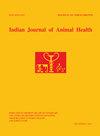Isolation of Phosphorus Solubilizing Bacteria from Mangrove Rhizospheric Sediment and its Potential Application in Aquaculture
IF 0.5
4区 农林科学
Q4 AGRICULTURE, DAIRY & ANIMAL SCIENCE
引用次数: 0
Abstract
Background: Phosphorus acts as a limiting nutrient in aquatic environments due to its non-availability as it forms insoluble precipitate with Ca, Mg, Fe and Al. Phosphorus solubilising bacteria (PSB) solubilizes the inorganic precipitate into soluble phosphorus. Methods: The PSB isolates were screened and isolated from rhizospheric sediment of mangrove, Avicennia marina of Ennore creek, Tamil Nadu. Their phosphorus transformation potential and the possibilities of their application in aquaculture to solubilize inorganic phosphorus were studied. Result: In the present study, thirteen nos. of PSB isolates were screened from the rhizospheric sediment samples of Avicennia marina collected from Ennore region and identified as Rhodococcus, Arthrobacter, Bacillus, Enterococcus, Staphylococcus and Pseudomonas. The P-solubilizing activity and Acid phosphatase (ACPase) activity of PSB isolates were found to be in the range of 7.62±0.51- 16.33±0.84 mg/l and 4.40±0.28 - 22.77±0.32 mmol ml-1 h-1 respectively. The maximum ACPase activity was exhibited by Arthrobacter sp (22.77±0.32 mmol ml-1 h-1) followed by Rhodococcus sp. (18.08±0.78 mmol ml-1 h-1). The P-mobilizing potential of the isolates obtained in this study were compared with the commercial product following a microcosm study for a period of 21 days. Rhodococcus sp showed higher ACPase activity in sediment (12.00 mmol g-1 h-1) than that of the commercial product (11.23 mmol g-1 h-1).从红树林根瘤沉积物中分离出溶磷细菌及其在水产养殖中的潜在应用
背景:磷与 Ca、Mg、Fe 和 Al 形成不溶性沉淀物,无法获得,因此成为水生环境中的限制性营养元素。磷溶解细菌(PSB)可将无机沉淀物溶解为可溶性磷。方法:从泰米尔纳德邦 Ennore 溪红树林 Avicennia marina 的根瘤沉积物中筛选并分离出 PSB 分离菌。研究了它们的磷转化潜力及其在水产养殖中应用于溶解无机磷的可能性。结果:在本研究中,从 Ennore 地区采集的 Avicennia marina 根瘤沉积物样本中筛选出 13 种 PSB 分离物,并鉴定为 Rhodococcus、Arthrobacter、Bacillus、Enterococcus、Staphylococcus 和 Pseudomonas。研究发现,PSB 分离物的钾溶解活性和酸性磷酸酶(ACPase)活性范围分别为 7.62±0.51 - 16.33±0.84 mg/l 和 4.40±0.28 - 22.77±0.32 mmol ml-1 h-1。节杆菌的 ACP 酶活性最高(22.77±0.32 mmol ml-1 h-1),其次是罗氏球菌(18.08±0.78 mmol ml-1 h-1)。在为期 21 天的微生态研究中,将本研究中获得的分离物的钾迁移潜力与商业产品进行了比较。在沉积物中,Rhodococcus sp 的 ACPase 活性(12.00 mmol g-1 h-1)高于商用产品(11.23 mmol g-1 h-1)。
本文章由计算机程序翻译,如有差异,请以英文原文为准。
求助全文
约1分钟内获得全文
求助全文
来源期刊

Indian Journal of Animal Research
AGRICULTURE, DAIRY & ANIMAL SCIENCE-
CiteScore
1.00
自引率
20.00%
发文量
332
审稿时长
6 months
期刊介绍:
The IJAR, the flagship print journal of ARCC, it is a monthly journal published without any break since 1966. The overall aim of the journal is to promote the professional development of its readers, researchers and scientists around the world. Indian Journal of Animal Research is peer-reviewed journal and has gained recognition for its high standard in the academic world. It anatomy, nutrition, production, management, veterinary, fisheries, zoology etc. The objective of the journal is to provide a forum to the scientific community to publish their research findings and also to open new vistas for further research. The journal is being covered under international indexing and abstracting services.
 求助内容:
求助内容: 应助结果提醒方式:
应助结果提醒方式:


